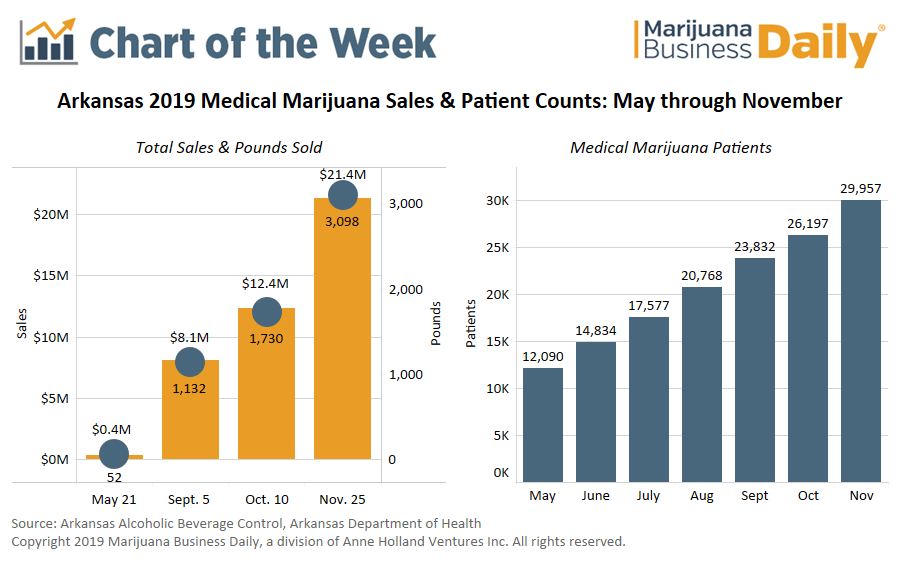Andrea Small-Howard has a unique view into how the medical side of the cannabis space is evolving.
She’s the chief science officer at GB Sciences, a Las Vegas-based marijuana company pursuing two strategies – one recreational, and the other aiming for U.S. Food and Drug Administration (FDA) approval of its medical cannabis products.
Small-Howard has led cannabinoid studies at The Queen’s Medical Center in Honolulu and the John A. Burns School of Medicine at the University of Hawaii.
She’s also held senior posts at pharmaceutical companies such as Radient Pharmaceuticals and International Biotechnology Solutions, both in California.
Marijuana Business Daily spoke with Small-Howard about advances in cannabis science, how medical marijuana markets are changing, and why GB chose to sell its Louisiana operations and more.
What kind of work are you doing around medical cannabis delivery methods?
What kind of delivery method you should use often depends on the condition you are trying to treat.
For example, if you have migraines, you care most about getting the medicine into your system, so you would want something like a metered-dose inhaler, which would be the medical equivalent of a smoke or vape – something fast-acting.
If you have chronic pain, then you look for something that gives you a longer therapeutic window, and time to onset isn’t necessarily your first concern.
We’ve been creating prototypes of our Parkinson’s disease formulations with a company called Catalent Pharma Solutions from the United Kingdom that is well known for delivery methods.
They were an attractive partner for us because one of their first products was Marinol gel caps (an anti-nausea medicine made from synthetic cannabinoids), so they also have experience working with cannabinoids in the context of the (U.S.) Drug Enforcement Administration (DEA) and FDA.
They have a delivery method called Zydis. It’s a wafer that dissolves. That was attractive to us because Parkinson’s patients have a hard time swallowing.
What kind of work are you doing around medical marijuana formulations?
We have access to lots of different chemovars. We spend a lot of time looking at different chemical variations, and we spend a lot of time trying to line them up with different disease conditions.
For example, if I started with a chemovar and it seemed like it might be good for Parkinson’s, I’d ask what’s the minimum number of compounds I would need from this particular chemovar to help Parkinson’s patients. Then, using a high throughput screening method, we can identify specific formulations.
It’s a lot of trial and error. Once we have more data and figure out the best combinations of THC and CBD with other chemicals, we’ll have much more effective medicines.
Some people may say all the money is in recreational marijuana. So why go through the expense, time and trouble of medical?
Because of marijuana’s federal illegality, it’s hard to protect formulations that you put into a dispensary.
From a business standpoint, the reason to go through the whole FDA process is so that you can own it.
That’s the payoff for the scientific work we’ve been doing. We’ve also been filing patents and protections in the United States and Canada.
How did selling GB Sciences’ stake in GB Sciences Louisiana to Wellcana Plus in September advance your goals, especially when many industry watchers felt the state’s market seemed so conducive to developing mainstream medical products?
Our core values are around research to make better products available. We’re staying in research.
The primary motivation for going into Louisiana in the first place was to establish research contacts, which we’ve done.
We’ve also been working with Wellcana, which for the last year or so has owned 50% of GB Sciences Louisiana, a subsidiary of GB Sciences.
We feel they’re great partners, and when there was a discussion about them taking over 100% of the operation, it seemed like a natural move.
It also allows us to deploy our capital for other projects we’re thinking about.
Do you feel like you may be missing a business opportunity by exiting Louisiana?
The Louisiana operations are well positioned in that there are only two licensees and the other operator, Southern University, is months behind us.
So, at this minute, there is an advantage to being in Louisiana.
But what we’ve seen in other limited license markets is that some competitors have successfully sued the state and gotten those programs opened up. So we don’t believe that’s going to be a monopoly for very long.
There were a lot of factors that went into that decision. We don’t have any regrets in leaving that market.
Did the fact that Louisiana was a limited market influence your decision?
One of the things we liked was that doctors and pharmacists were so involved with patients and there was a lot of recordkeeping. But it was also limited.
It’s great from a data collection standpoint – not as great on the commerce side.
But it’s hard for patients to get (Louisiana medical marijuana) cards, and they have to check in with doctors every three months to get the next round of cannabis.
That’s good for research and data collection, but there are a lot of bottlenecks.
This interview has been edited for length and clarity.
Omar Sacirbey can be reached at omars@mjbizdaily.com







